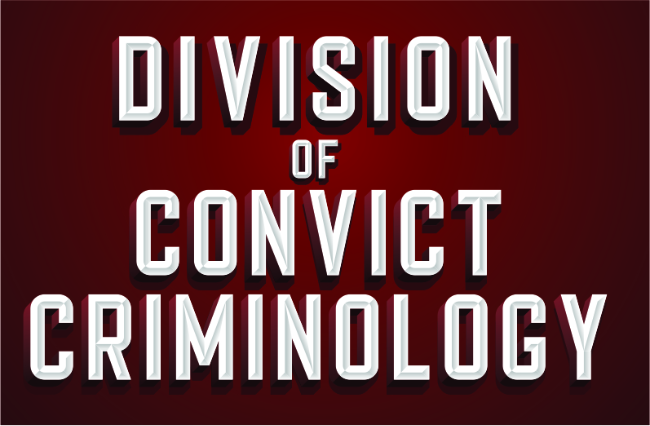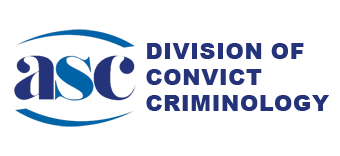
The Division of Convict Criminology (DCC) of ASC invites nominations for this year’s awards (2024).
John Keith Irwin Distinguished Scholar Award (Nomination Deadline: September 30, 2024)
This award recognizes sustained outstanding professional contributions by an individual to the study of Convict Criminology. Scholarly contributions may be empirical or theoretical. Professional contributions also include advocating for Convict Criminology as an area of scholarship within criminology and related disciplines and mentoring graduate students. Persons who have made substantial practical contributions to insider perspectives of criminal and deviant behavior also are eligible to receive this award. The committee may elect not to give this award in any given year.
- In 1967, John Keith Irwin founded Project Rebound, a program which helps those coming out of prison go to college. Irwin co-founded the Prisoners Union in 1971, which organized inmates to push for their civil rights and worked closely with the California legislature on the Uniform Sentencing Act passed in 1976. In 1985, he received the August Vollmer award from the American Society of Criminology. At a panel presentation at the American Society of Criminology’s annual conference in 1997, Irwin encouraged the establishment of the Convict Criminology group, a collective of formerly-incarcerated individuals who became professors that critically examine the carceral system.
Frank Tannenbaum Outstanding Book Award (Nomination Deadline: September 30, 2024)
This award recognizes outstanding scholarship in a monograph or textbook within Convict Criminology. Books published within three years of the award are eligible for consideration. The committee may elect not to give this award in any given year.
- Frank Tannenbaum is unofficially considered by many scholars to be the first “convict criminologist” in the United States. His book, Wall Shadows: A Study in American Prisons, was one of the earliest narrative accounts of incarceration experiences in criminology. In 1931, he reported to the Wickersham Commission study on Penal Institutions, Probation and Parole. He taught criminology at Cornell University. His conception of the “Dramatization of Evil” led to the further development of labeling theory.
Early Career Award (Nomination Deadline: September 30, 2024)
This award recognizes outstanding contributions to Convict Criminology scholarship by persons early in their professional careers. To be eligible for this award, an individual must have received his or her terminal degree no more than eight years before the year of the award and have developed a strong research agenda in Convict Criminology since the time of the terminal degree as indicated by regular publications. The committee may elect not to give this award in any given year.
Outstanding Article or Book Chapter Award (Nomination Deadline: September 30, 2024)
This award recognizes outstanding scholarship in the form of an article or book chapter in Convict Criminology. Articles or chapters published within three years of the award are eligible for consideration. The committee may elect not to give this award in any given year.
Student Paper Award (Nomination Deadline: September 30, 2024)
The Student Paper Award recognizes scholarly work of students in Convict Criminology. Students working by themselves or as part of a team of co-authors who are currently enrolled in an academic program or a recent graduate of such a program (no more than one year removed from the year of the award) at either the undergraduate or graduate level are eligible for the competition. Paper submissions may be conceptual, theoretical, and/or empirical (quantitative or qualitative) and must be a completed project directly related to Convict Criminology. Papers must be the work of one or more students but should not be co-authored with a faculty member, though a review and endorsement by a faculty member of the student’s choice is required for submission. Papers must also be a maximum of 30 pages (including tables and references) and formatted in APA style. The committee may elect not to give this award in any given year.
Outstanding Teacher Award (Nomination Deadline: September 30, 2024)
The Outstanding Teacher Award recognizes contributions that have made a significant impact on the teaching of convict criminology at the local, state, regional, national, or international level. These contributions may include a) exemplary classroom teaching and/or student engagement activities, b) leadership and innovation in teaching developments such as the preparation of teaching and curriculum-related materials and publications, c) contributions to the scholarship on teaching and learning, and/or d) contributions to the enhancement of teaching within state, regional or national associations. To be clear, this award is available to any teacher, and not just faculty teaching at institutions of higher education. The committee may elect not to give this award in any given year.
Outstanding Mentor Award (Nomination Deadline: September 30, 2024)
The Outstanding Mentor Award is designed to recognize excellence in mentorship. Nominations of individuals at all stages of their academic careers are encouraged. Nonstudent members may be nominated by colleagues, peers, or students but self-nominations are not allowed. A detailed letter of nomination should contain concrete examples and evidence of how the nominee has sustained a record of enriching the professional lives of others. The letter of nomination should specify the ways the nominee has gone beyond his/her role as a professor, researcher, or collaborator to ensure successful enculturation into the discipline of Criminology and Criminal Justice, providing intellectual professional development outside of the classroom, and otherwise exemplary support for undergraduates, graduates, post-graduates, and/or currently incarcerated students. If relevant, then be sure the letter specifically highlights mentorship involving justice-impacted undergraduates, graduates, post-graduates, and/or currently incarcerated students. Award decisions will be based on the strength of the nominee’s qualifications and not on the number of endorsements for any particular candidate. The committee may elect not to give this award in any given year.
Requirements/Deadlines/Procedures:
● Nominations may be submitted by DCC and non-DCC members.
● No nominee will be considered unless these materials are provided and arrive by the deadline of September 30, 2024.
● Winners will be notified by November 11, 2024 and are strongly encouraged to be present at the DCC Social & Awards Ceremony during the annual meeting of the ASC.
● The committee reserves the right to give no award in a particular year if it deems this appropriate.
● Self-nominations are welcomed and encouraged for all awards other than the Outstanding Mentor Award.
Inclusivity and Language:
The executive board of the Division of Convict Criminology wishes to remind anyone intending to submit a nomination that:
- A nominee’s lived-carceral-experience (or lack thereof) is NOT a prerequisite for any of these awards.
- No one should be described as a “convict criminologist” unless they have expressly identified as such in prior publications or public communications.
- We encourage the use of person-centered language in nomination materials.
Selection Criteria:
The nominees are evaluated by the awards committee based on their scholarly work, their commitment to Convict Criminology as a research discipline, and their commitment to Convict Criminology as advocates, particularly in terms of dedication to the Division of Convict Criminology.
Nomination Materials:
In submitting your nomination, please provide the following supporting materials in PDF format: (1) A letter evaluating the nominee’s contribution and its relevance to the award; (2) The nominee’s C.V. (short version preferred); (3) To nominate a book, please also submit the title of the book, its author(s), the publisher, the year of the publication, and a brief statement of support describing its contributions to Convict Criminology.
Please submit nominations and all supporting materials by September 30, 2024 to: https://forms.gle/yFSfRptpiDXcJmcXA
Questions:
If you have any questions, please contact the chair of the DCC Internal Awards Committee:
- Jeffrey Ian Ross (jross@ubalt.edu)
History of Division of Convict Criminology Awards
John Keith Irwin Distinguished Scholar Award
- (2020) – Jeffrey Ian Ross
- (2021) – Francesca Vianello
- (2023) – Sacha Darke & Andreas Aresti
Frank Tannenbaum Outstanding Book Award
- (2020) – “Out of the Red: My Life of Gangs, Prisons, and Redemption” by – Christian Bolden
- (2021) – “Twenty Million Angry Men: The Case for Including Convicted Felons in Our Jury System” by – James M. Binnall
- (2023) – “Divide & Conquer: Race, Gangs, Identity, and Conflict” by – Robert Weide
Early Career Award
- (2020) – James M. Binnall
- (2021) – Jennifer M. Ortiz
- (2023) – Sinem Bozkurt
Outstanding Article or Book Chapter Award
- (2020) – “The System Is Not Broken, It Is Intentional: The Prisoner Reentry Industry as Deliberate Structural Violence” by – Jennifer M. Ortiz & Hayley Jackey – in The Prison Journal
- (2021) – “Formerly Incarcerated Black Mothers Matter Too: Resisting Social Constructions of Motherhood” by – Michael B. Mitchell & Jaya B. Davis – in The Prison Journal
- (2023) – “Let the Convicts Speak: A Critical Conversation of the Ongoing Language Debate in Convict Criminology” by – Jennifer M. Ortiz, Alison Cox, Daniel R. Kavish, & Grant Tietjen – in Criminal Justice Studies
Student Paper Award
- (2020) – N/A
- (2021) – N/A
- (2023) – Kristen Catoe
Outstanding Teacher Award
- (2020) – J. Renee Trombley
- (2021) – Daniel R. Kavish
- (2023) – Denise Woodall & James Wojtowicz
Outstanding Mentor Award
- (2020) – Ronald Simons
- (2021) – Marianne Fisher-Giorlando
- (2023) – Breanna Boppre & Alison Cox
